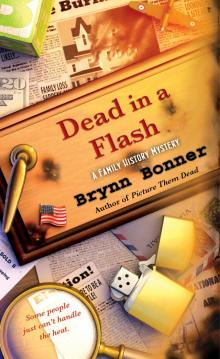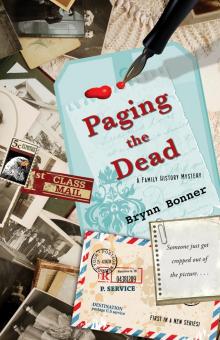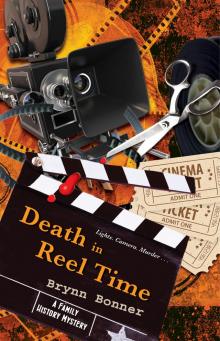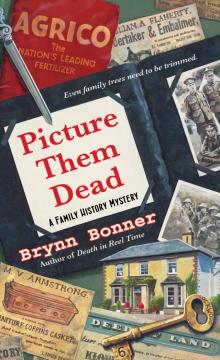- Home
- Brynn Bonner
Dead in a Flash Page 4
Dead in a Flash Read online
Page 4
“No. You think he was feeling left out?” Esme asked as she slammed the SUV’s door and adjusted the mirror.
“I don’t know about that, but he was definitely making eyes at Chelsea Bremer. And she was makin’ ’em right back. I think they may have a thing going.”
“No doubt that’s a union everybody would bless,” Esme said.
“Or maybe not,” I said. “Dinah Leigh’s son—his name is Ken, by the way—might object. I overheard Lenora telling her daughter that she thinks Ken’s hot for Chelsea. Only, Lenora is a lady, so she said smitten. They were speculating about whether Ken would show up for the event. I think he’s in Uzbekistan or Kazakhstan or one of the -stans. Anyhow, their conversation didn’t mean anything to me at the time because I hadn’t met any of these people, but I took note because Lenora is usually so circumspect and I was surprised she was gossiping. She said she thought Ken’s desire to see Chelsea would bring him, even if the obligation to honor the senator wouldn’t.”
“You sure picked up a lot,” Esme said. “I guess it’s true about little pitchers having big ears.”
“I prefer to say I’m observant and a good listener. Anyhow, I’d never repeat any of that to anybody but you—and maybe Jack.”
“Let’s hope you never turn to the dark side,” Esme said with a smile. “With all the family secrets trapped in your little head, you’re a walking Pandora.”
“True,” I said, “but I’ll always walk in the light and I know to keep my lid shut. Now, let’s talk about the schedule; it’s gonna be tight.” I sighed, feeling blue at the realization I’d have little time to spend with Jack over the next couple of weeks. “But it’s doable. Unless something weird pops up to bite us.”
“And there, you’re doing it again,” Esme said, giving me an exasperated look. “What did I tell you about saying things like that!”
I smiled, but I felt a twinge of apprehension that wasn’t helped by the yellowish tint in the sky and the clouds roiling into a thunderhead in the east.
* * *
As soon as we got home, Esme and I headed for the workroom. The first thing I did was track down that troublesome article online. Lincoln was right. It was bad.
“I thought maybe Lincoln was overstating things,” Esme said. “But this sounds to me like this Chad Deese set out to paint the senator’s family in a bad light.”
“Sure looks that way,” I mused. “Or maybe we’re not objective. Anyhow, we can’t get sidetracked. While you finish up that last scrapbook, I’ll see what I can find out about the fire investigation.”
We worked companionably for an hour or so, the silence broken only by the clacking of my computer keys as I ferreted out what I could about the house fire that killed little Johnny Sawyer back in 1947. The actual incident and subsequent investigation seemed pretty cut-and-dried, though there was reference in one newspaper article to a “proper” death certificate being issued. As opposed to what? An improper death certificate?
In the early days there had been numerous stories, some quite sensational, about the parents and their quest to find the child they believed had survived the inferno. Gradually the interest in the case had petered out, and as far as I could tell, there hadn’t been any stories in print about the parents’ obsession since the mid-sixties—not until today.
Esme’s phone trilled. “That’d be fine,” she said to the caller, “long as you don’t linger. We’ve got work to finish up tonight.”
I didn’t need to ask who it was. Esme has an ironclad rule for Denny—no unannounced visits. He has to call before he comes over, and she gets to set the limits on how long he stays.
Denny is a patient man. He obeys the letter of Esme’s law, but he must’ve been sitting in his car at the curb when he called, because he came into the workroom about a minute and a half after she clicked off.
My house has normal, to-code doorways, and Denny didn’t need to duck when he came in the room, but I suspect he’s cracked his head enough times that it’s a built-in reflex by now. “How are the night toilers?” he asked as he straightened to full height.
“Busy,” Esme said. “You just getting off? I could fix you something to eat, but it’d have to be scrambled eggs or something else quick.”
“I’m good,” he said, plopping into a chair with a whoosh of breath. “I had a supper break. You about finished with Senator Stan’s project?”
“Last scrapbook,” Esme said, “so we’re set for Saturday, but I’ve got a hunch we won’t be done with the senator for a good while yet.”
In response to his quizzical look I told him about being hired to look into the fire.
“Nineteen forty-seven,” he repeated. “You’ll be after sheriff’s department records. I wouldn’t expect much; written reports from back then tend to be a bit sparse.”
“I hope they wrote their pencils down to stubs in this case,” Esme said. “We need every fact we can scare up.” She told him about the article that had caused today’s uproar.
Denny nodded. “Oh, yeah. I remember. And no disrespect to the senator, but from what I recall, his parents were pretty obsessed.”
“What could you know about it, Denny?” I asked. “You weren’t even born when that fire happened.”
“Nope,” Denny said, “but when I was a kid there was a billboard, sort of a homemade thing, set up on a state road that runs through Quinn County. It was on the route we took to my grandmother’s house. It was huge and hand-lettered, so it got your attention. It offered a reward for information about a missing baby, John David Sawyer. The senator’s father put it up.”
“Okay, still,” I said, “if they believed their child had been abducted in those early stages, that doesn’t seem too unorthodox a thing to do.”
“Billboard’s still there,” Denny said. “Least it was the last time I was out that way. It’s grown over with weeds and untended now that the senator’s father has passed. But he maintained it faithfully till he died, upping the reward every now and again. It used to be a curiosity to me and my sister to see what the reward amount was each time we went out to see Grandma.”
“Was there any good reason to believe that baby did survive the fire?” Esme asked.
Denny shrugged. “I don’t know much about the case. I just remember seeing that billboard growing up and thinking that was a long time for a person to hold on to hope in spite of evidence to the contrary, which there surely must’ve been. Either there was something really wrong there with the way the case was handled, or the child’s death drove the parents over the edge. I don’t know which. I know some people over in Quinn County—want me to ask around?”
“Yes, please,” I said, feeling my skin start to prickle.
“And we’ve got another job stacked up in front of that,” Esme said and told him about being hired by Dinah Leigh.
Denny whistled, long and low. “First the senator, now Dodd Enterprises? You two are in high cotton,” he said.
“You, too,” Esme said with a smile. “We’ve been invited to the big shindig on Saturday as actual guests. You’ll be my plus one.”
“I’ll go dust off my glad rags,” Denny said, rising to go. “And I think I’ll need to do some manscaping.” He patted his close-cropped hair as he bent to give Esme a good-bye kiss.
We quickly got reabsorbed in the work at hand, both of us lost in our own thoughts.
After a long while, Esme’s words whispered into the silence. “Yes, it is,” she said. “That’s a very long time to hold out hope.”
three
DINAH LEIGH’S BROTHER WAS NOTHING like I’d pictured. While Dinah Leigh was fair and petite, Conrad Nelson was tall and rangy, with a golden tan and a prodigious shock of brown hair shot through with gray. But like Dinah Leigh, he was fit and energetic and had the same laugh and amiable nature.
When she introduced us he gushed so effusively, I felt like a rock star. I don’t get that much—people who aren’t into family history generally find the whole subject a big snooz
e. I like to think that’s because they don’t appreciate how important it is to know about the people you come from and how their stories shape your own. But Conrad had latched onto his family history quest with all the rabidity of a European soccer fan.
He started rattling off what he’d learned before we even sat down, and I had to stop him. “Let me get set up,” I said. “I don’t want to miss anything.”
“Sorry,” he said with a laugh. “I get carried away.”
“And so shall I,” a woman’s voice rang out. I turned to see her sweep into the room. She was snugged in a terry beach wrap and wearing flip-flops. “Get carried away, that is,” she said, walking over and putting out a hand. “I’m Con’s fiancée, Phoebe Morris, and I’m so glad you’re here, Sophreena. Dinah Leigh has told us all about you, and you are my rescuer. I love this man madly, but I can’t listen to one more telling of the begats or my head will spin off.”
Phoebe Morris was one of those women who could make time stop when she entered a room, and I realized I’d frozen with my notebook and cell phone halfway to the coffee table. It wasn’t just that she was gorgeous, though she was that. She had a full mane of golden-brown hair with a streak of pure silver framing her face and the largest, greenest eyes I’d ever seen. But she also had that quality of being simply a presence. I sincerely hoped she and Dinah Leigh did take to each other. It would be a battle royal if they ever locked horns.
“I’m off to the pool,” she said. “But I wanted to remind you, Con, we’re supposed to take your aunt Yvonne to lunch.”
“Oh, joy,” Conrad said with a grimace. “I’ll need a workout before I face that. I’ll be down to join you shortly.”
“No hurry,” she said, bending to give him a peck on the top of his head. “I’ll do my laps while you talk.” She turned to go, then looked back over her shoulder and mouthed a silent but heartfelt thank you in my direction.
“She’s lovely,” I said as I flipped open my notebook.
“That she is,” Conrad said, gazing after her. “I’m a lucky man.” Then the smile disappeared as he looked down at the table. “I hope you won’t find me insufferable for saying this, but it’s a particular pet peeve of mine; must we have the cell phone out?”
I smiled. “I promise I won’t answer if it rings, but I use the camera a lot, and I see you’ve brought some notes. If you have no objection, I’d like to snap a photo of those. I’ll take my own notes as we talk, but sometimes it helps to have something to cross-check.”
“I’d never thought of that,” Conrad said with a laugh. “I’m hopelessly old school. I still go to the library carrying a bag of quarters for the copy machine.”
Over the next half hour, Conrad shared everything he’d discovered about his family lineage and I took copious notes. He’d actually uncovered more than I’d dared hope for and I felt less pressure about the job. Conrad was a proud man, but not arrogant. He’d spent his entire working life as a city planner in various cities across the nation. He’d been retired for two years, which had allowed him free time for family research. “I always wanted to do it,” he said, “and at my age I’m getting philosophical. The whole idea of what it means to be family is of keen interest to me now.”
“Me, too,” I said. “I have blood kin out there somewhere that I’ve never met, yet most of the people who form my family aren’t related. It’s complicated.”
Conrad leaned forward and clasped his hands together. “Just so you understand a little of where I’m coming from, let me share how Dinah Leigh and I grew up. If you ask Dinah Leigh, she’ll whitewash it and tell you we had a lovely childhood with loving parents and only sunshine and warm puppies all of our days. Dinah Leigh’s good at seeing the picture she wants to see. But sadly, that wasn’t our reality. Our parents loved us, but conditionally, very conditionally. Our father doted on Dinah Leigh, but hardly seemed to remember he had a son. He was injured in an accident at the graphite plant and it left him scarred in more ways than one. There were times when alcohol was a problem for him—and therefore for us. And our mother, as if to make up for his deficiencies, coddled me to the point of suffocation. She was, on her best days, a little capricious. On her bad days, plain scary. Also, the folks fought a lot. And they weren’t quiet arguments hoarsely whispered in the night. They were loud, disturbing altercations. I’m surprised they stayed together and honestly I think it was only out of inertia that they did. They weren’t self-aware people and they were dreadful at communication. I know that sounds disrespectful”—he nodded as if deep in thought—“but it’s honest. They had their good points. They kept us clothed and fed and tried to make sure we each got a good education, but they didn’t leave us a good model for family life. I think that’s why I’ve been alone, by choice, all these years. Dinah Leigh was luckier. She fell in love with a patient, persistent man and had a happy family, the marriage part anyhow. The parenting part? Jury’s still out on that one. She was devastated by Preston’s death—that’s why she threw all her energy into the company. People underestimate Dinah Leigh at their own peril. She may come off like a flibbertigibbet sometimes, but she’s a strong woman and smart, uncommonly smart. But I digress. I wanted you to know I have my own reasons for looking into our family history now that I’m making this big commitment,” he said, glancing toward the door Phoebe had exited. “I’d like to understand what made my parents’ relationship what it was and avoid that if I can. Maybe find something in our tree that’s a bit more admirable.” He smiled, but it was a sad smile.
“I understand,” I said with a nod. “And, of course, I think that’s a wise pursuit.”
I glanced at the clock and realized I needed to wrap this up. “I can tell you this,” I said, “your sister is very devoted to you.”
He chuckled. “Dinah Leigh decided long ago she needed to look after me. It’s the Hansel and Gretel syndrome, I suspect, where the siblings form an especially close bond because there’s something lacking in their parents’ care.”
“Happens in lots of families,” I said.
“I was a sickly baby, or so I’m told,” he said as he walked me to the door. “Dinah Leigh helped look after me back then and she’s never gotten out of the habit of worrying about my welfare. It’s sweet and I love her for it, but sometimes it can get a little restrictive, if you know what I mean.” He tugged theatrically at the collar of his shirt.
I thought of my relationship with Esme. She looked after me with all the tender love and care of a mother. And, like some mothers, she interfered in my life with unsolicited advice and unwelcome admonitions.
“Yes,” I said as he opened the door. “I know precisely what you mean.”
As I stepped out of Conrad’s room, Esme and Lincoln were coming down the hallway. The elevator dinged and as the doors opened, we saw Chelsea craning her neck to see around the cardboard box she was carrying. Lincoln broke into a trot and took the box from her as the elevator doors started to close.
Chelsea laughed as she thanked him and in the moment of silence that followed, both of them looked like kids caught with their hands in the cookie jar. “I was hoping I’d see you,” Chelsea said to me once she’d gotten her grin under control. “This is the family stuff from Dinah Leigh’s house. She’s asked me to organize it and make copies of everything. I can bring it to you later if you’re headed out.”
“I’ll be here awhile longer,” I said, glancing at the box. It was bigger than Dinah Leigh had indicated, but smaller than I’d hoped. “I’m to interview Dinah Leigh’s aunt Yvonne when she gets here. I’ll text you before I go to see where you are with it.”
“Okay,” Chelsea said. “Dinah Leigh’s down in the café if you want to check in with her.”
“We’ll do that,” I said, looking at Esme, “if you’re all done, that is.”
“All done, I think,” Esme said, looking a question at Lincoln, who seemed distracted by Chelsea’s proximity.
“Yes, great,” he said. “You did a phenomenal job. Really great
.” He turned to Chelsea. “I can carry this for you.”
Chelsea directed him down the hall and they disappeared into her room.
“Hm,” Esme said. “Not sure how much work she’ll get done in the next little bit.”
“Wonder why it’s such a big secret,” I said. “They’re both single and free to see whoever they’d like, right?”
“Yes, but it might not be that simple,” Esme said as she pushed the call button for the elevator. “Chelsea’s devotion to Dinah Leigh runs pretty deep, from what Lenora told me. I suspect she’d be hesitant to leave Dinah Leigh just now. She grew up poor and without much family support and not many prospects. One of the first things Dinah Leigh did when she took over the company was award five full-ride scholarships to promising students, and Chelsea was one of the chosen that first year. Dinah Leigh took a personal interest in her scholarship kids and that’s when they first met. Chelsea was seventeen. She’s almost like a daughter to Dinah Leigh. And as you picked up, I think there might be some sort of history between her and Ken Dodd. Maybe Chelsea doesn’t want to disappoint him and by extension Dinah Leigh.”
“Maybe,” I allowed, “but Dinah Leigh would have to be blind not to notice the vibe between Lincoln and Chelsea.”
Esme shrugged. “Sometimes people won’t see what they don’t wanna see.”
As we stepped into the elevator, I realized Conrad had just told me that very thing about Dinah Leigh.
When we got to the ground floor Esme went off to locate the event planner to find out where the scrapbooks were to be set up, and I went to the café. I spotted Dinah Leigh with a younger woman I hadn’t met at a window seat overlooking the pool. As I approached, I spotted Phoebe Morris still swimming determined laps.
“. . . flake and gold digger,” I overheard as I moved toward the table, the comment coming from the younger woman.
“Well, I think you’re wrong,” Dinah Leigh said. “I like her.”
Both women looked up as I drew closer, and the younger woman gave me a bright smile. But when Dinah Leigh introduced me to her daughter, Patricia, the smile dimmed. “Yes, nice to meet you,” she said with all the sincerity of a door-to-door vacuum salesman.

 Dead in a Flash
Dead in a Flash Paging the Dead
Paging the Dead Death in Reel Time
Death in Reel Time Picture Them Dead
Picture Them Dead